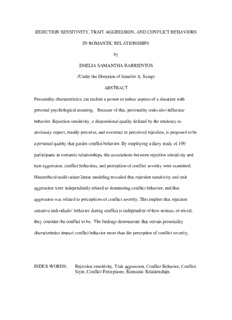
rejection sensitivity, trait aggression, and conflict behaviors in romantic relationships PDF
Preview rejection sensitivity, trait aggression, and conflict behaviors in romantic relationships
REJECTION SENSITIVITY, TRAIT AGGRESSION, AND CONFLICT BEHAVIORS IN ROMANTIC RELATIONSHIPS by EMELIA SAMANTHA BARRIENTOS (Under the Direction of Jennifer A. Samp) ABSTRACT Personality characteristics can incline a person to imbue aspects of a situation with personal psychological meaning. Because of this, personality traits also influence behavior. Rejection sensitivity, a dispositional quality defined by the tendency to anxiously expect, readily perceive, and overreact to perceived rejection, is proposed to be a personal quality that guides conflict behavior. By employing a diary study of 100 participants in romantic relationships, the associations between rejection sensitivity and trait aggression, conflict behaviors, and perception of conflict severity were examined. Hierarchical multivariate linear modeling revealed that rejection sensitivity and trait aggression were independently related to dominating conflict behavior, and that aggression was related to perceptions of conflict severity. This implies that rejection sensitive individuals’ behavior during conflict is independent of how serious, or trivial, they consider the conflict to be. The findings demonstrate that certain personality characteristics impact conflict behavior more than the perception of conflict severity. INDEX WORDS: Rejection sensitivity, Trait aggression, Conflict Behavior, Conflict Style, Conflict Perceptions, Romantic Relationships REJECTION SENSITVITY, TRAIT AGGRESSION, AND CONLFICT BEHAVIORS IN ROMANTIC RELATIONSHIPS by EMELIA SAMANTHA BARRIENTOS B. A., Pepperdine University, 2005 M. A., The University of Georgia, 2007 A Thesis Submitted to the Graduate Faculty of The University of Georgia in Partial Fulfillment of the Requirements for the Degree MASTER OF ARTS ATHENS, GEORGIA 2007 © 2007 Emelia Samantha Barrientos All Rights Reserved REJECTION SENSITIVITY, TRAIT AGGRESSION, AND CONLFICT BEHAVIORS IN ROMANTIC RELATIONSHIPS by EMELIA SAMANTHA BARRIENTOS Major Professor: Jennifer A. Samp Committee: Tina M. Harris Jennifer L. Monahan Electronic Version Approved: Maureen Grasso Dean of the Graduate School The University of Georgia August 2007 iv DEDICATION This thesis is dedicated to Michael Casey, whose unyielding support and encouragement persisted despite his personal trials. His confidence in me was a continued source of inspiration throughout the completion of this work, as was the perseverance he demonstrated. v ACKNOWLEDGEMENTS It is difficult to overstate my gratitude for my advisor, Jennifer Samp, for her help throughout the entire thesis process. Her guidance extended from the conception of this project to its conclusion and beyond. I would like to thank Tina Harris and Jennifer Monahan for their helpful comments on an earlier version of this thesis. I am indebted to my colleagues for their assistance in data collection. I would like to thank David Cisneros, Todd Goen, Christopher Groscurth, Shawna Harris, Eric Jenkins, Dr. Kristine Schaller, and Austin Scott for their help with the data collection for this work. I am grateful for Matthew Bruce, whose unconditional support sustained me during my time at the University of Georgia. Lastly, and most importantly, I wish to thank my parents, Mary Lou Barrientos and Delfina Bedarte, whose unending love and support is the only reason I have made it this far. Together they instilled in me the value of education, the desire to achieve, and the courage to follow my dreams. vi TABLE OF CONTENTS Page ACKNOWLEDGEMENTS.............................................................................................................v LIST OF TABLES.......................................................................................................................viii CHAPTER 1 INTRODUCTION.........................................................................................................1 2 CONFLICT STYLES, CONFLICT BEHAVIORS, AND REJECTION SENSITIVITY...........................................................................................................4 Conflict Styles and Behaviors ..................................................................................4 Rejection....................................................................................................................8 Responses to Rejection............................................................................................13 3 METHOD....................................................................................................................23 Sample and Procedure.............................................................................................23 Measures in the Initial Assessment Battery............................................................26 Diary Measures........................................................................................................29 4 RESULTS....................................................................................................................32 Preliminary Analyses..............................................................................................32 Test of Hypotheses..................................................................................................34 5 DISCUSSION..............................................................................................................44 Overview of Statistical Analyses............................................................................44 Conflict Style and Conflict Behavior......................................................................45 Rejection Sensitivity and Conflict...........................................................................46 Trait Aggression and Conflict.................................................................................51 vii Limitations and Future Research.............................................................................52 6 CONCLUSIONS..........................................................................................................55 REFERENCES..............................................................................................................................60 APPENDICES...............................................................................................................................68 A Rejection Sensitivity Questionnaire.............................................................................68 B Spouse Specific Assertion Aggression Scale...............................................................77 C Initial Rahim Organizational Conflict Inventory- II....................................................82 D Conflict Severity Scale................................................................................................85 E Diary Rahim Organizational Conflict Inventory- II....................................................86 viii LIST OF TABLES Page Table 1: Zero Order Correlations between Personality and Conflict Episode Variables..............38 Table 2: Zero Order Correlations between Conflict Behaviors from each Conflict Report..........39 Table 3: Zero Order Correlations between Conflict Perceptions and Conflict Behaviors from each Conflict Report.......................................................................................................40 Table 4: T-Test for Sex Differences across Personality and Conflict Episode Variables.............41 Table 5: Multilevel Regression for Conflict Style as Predictor of Conflict Behavior...................42 Table 6: Multilevel Regression for Predicting Conflict Behavior from Rejection Sensitivity and Trait Aggression..............................................................................................................42 Table 7: Multilevel Regression for Predicting Perceptions of Conflict Severity from Rejection Sensitivity and Trait Aggression.....................................................................................43 1 Chapter 1: Introduction In general, people have an exceptionally strong need to feel accepted and valued by others, and an even stronger aversion to being rejected (Baumeister & Leary, 1995). As essential sources of emotional, psychological, and physical well-being, intimate relationships provide the potential for basic needs of belonging and acceptance to be fulfilled (Baumeister & Leary, 1995; Burman & Margolin, 1992; Wood, Rhodes, & Whelan, 1989). As intimacy between partners increases, so does their interdependence, which coalesces to produce the viable conditions for conflict to occur with regularity in romantic relationships. As an inevitable consequence of the growth and change that take place within intimate relationships, conflict is not inherently negative. Conflict characterizes intimate relationships regardless if they are distressed or not. It is the manner in which conflict is handled that results in negative relational consequences (O’Connell- Corcoran & Mallinckrodt, 2000). Somewhat paradoxically, conflict is a hallmark of intimate relationships, and can also be a major determinant of their decline. For example, intimate relationships are more likely to be physically and psychologically abusive than less intimate ones (see Roloff & Cloven, 1994). The transgressions that incite conflict, and the damaging behaviors that can occur during conflict, present serious challenges for partners and generally result in decreased relational satisfaction (Wills, Weiss, & Patterson, 1974). Given the certainty of hurtful and provocative events in intimate relationships, individual differences in response to relational disturbances are of special interest to the study of communication. Addressing this issue in research will assist communication scholars in understanding how the dynamics underlying conflict effect how they are handled.
Description: